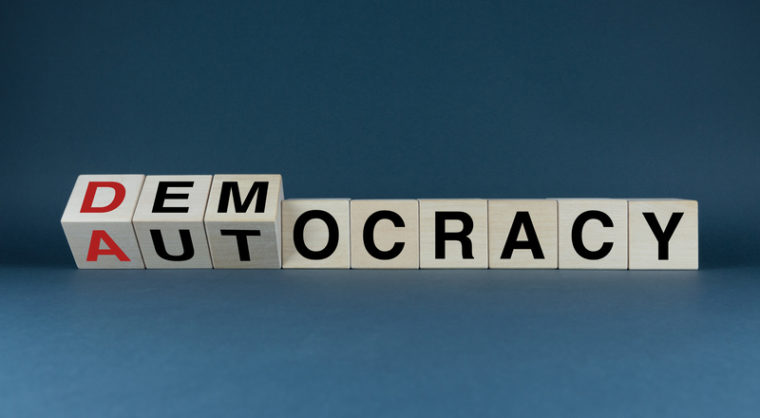
Democracies are in trouble both globally and domestically. Freedom House, a non-partisan organization that tracks global democracy, states that democracy on the planet peaked in 2006, and has consistently declined for the last 18 years. In 2006 eighty-nine countries were democratic, and in 2024 the number of democracies has dropped to seventy-four. Domestically, Americans are extremely unhappy with our political system. According to the Pew Research Center only four percent of American adults think our system is working well. Americans have very negative views of governmental institutions, political parties and politicians.
Why are democracies in trouble?
Pundits cite coups, revolutions, wars, economic downturns, corruption, fixed and flawed elections. These events are certainly factors, but they are external environmental causes. There are also psychological and cultural reasons existing within citizens of democracies.
The building blocks of democracy, as delineated in the Declaration of Independence, require a set of internalized virtues in every citizen. Equality and rights for all requires tolerance of diversity. Agreeing to the rule of law requires a belief in non-violent conflict resolution, and a resistance to the dictatorial impulse. Acting upon the idea that the people ultimately have the political power requires an understanding of and an engagement in civic governance.
One might think that there should not be a need for these virtues, because, after all, the desire for freedom is a human universal. And since democracy enhances freedom, democracy should be easy to create and maintain. However, democracy is the most complex and confusing form of governance, so only if the virtues discussed above are present will the desire for freedom lead to democracy. Three trends indicate the difficulty of creating and maintaining these virtues.
The first trend is complacency.
When living in a democracy it is easy to forget that each of us has an obligation to uphold democracy. Not voting in elections is the most obvious sign of complacency, but there are others. Many Americans have little understanding of how democratic governance is structured, and how the democratic process works, and they don’t get involved in the political process. As the polling results cited above show, we blame our ignorance and complacency on the institutions and the politicians, rather than acknowledging our own laziness.
The second trend relates to the widespread dissemination of information and choice.
Democracy opens the door to a wide range of divergent publicized attitudes and behaviors. Because democracies allow so much choice, some people engage in behaviors that others despise. Thus democracies always features lots of disagreement. Preventing disagreement from becoming intense us versus them conflict requires diversity tolerance, which is increasingly difficult to sustain. Modern media, including social media, emphasizes differences and the conflicts that occur because of differences. The media does not emphasize tolerance of differences.
A third trend related to democratic decline is the increasing complexity of modern life, especially in a democracy.
We now have access to instant knowledge about everything that happens everywhere. The human brain is ill-adapted to process the massive amounts of information and choices available now. Democracy, by increasing choice and dividing power, increases the complexity of modern life even more.
Overwhelming complexity leads to a desire for simplicity. For some the desire for simplicity requires dismantling democracy, which is part of the dictatorial impulse. Some citizens of democracies, fed up with the complexities, inefficiencies, apparent corruption, and general messiness of democracy, long for a dictatorial ‘strongman’ to take power and restore idyllic simplicity. One could argue that the increasing number of dictatorships on the planet is a manifestation of the ‘strongman’ desire.
Democracy is a fragile flower that has rarely blossomed in human history. Democracy is vulnerable to external threat from non-democracies, and external threats are exacerbated by democratic citizen complacency, ‘democracy fatigue’, and lack of democratic virtues.
Democracies can only exist if citizens have internalized and act upon the discussed virtues. These virtues are the responsibilities we bear to have the benefits and the freedom we all enjoy.
ID 264714732 ©
Prazis | Dreamstime.com
















